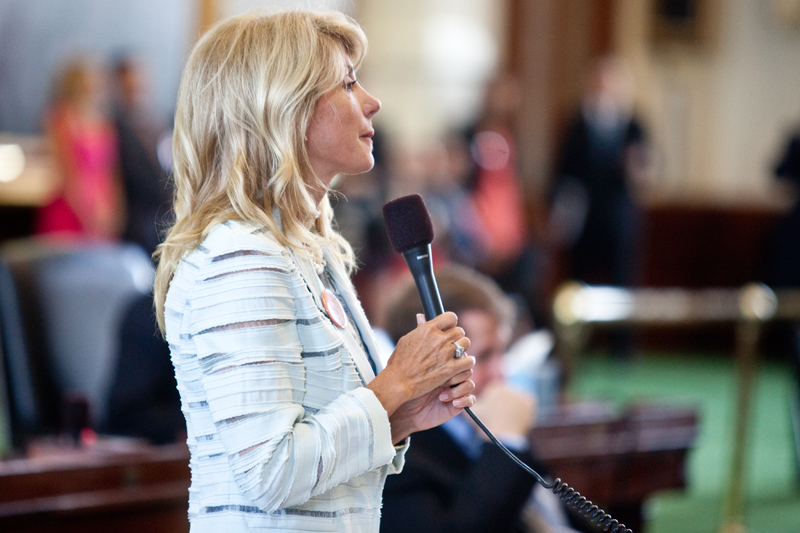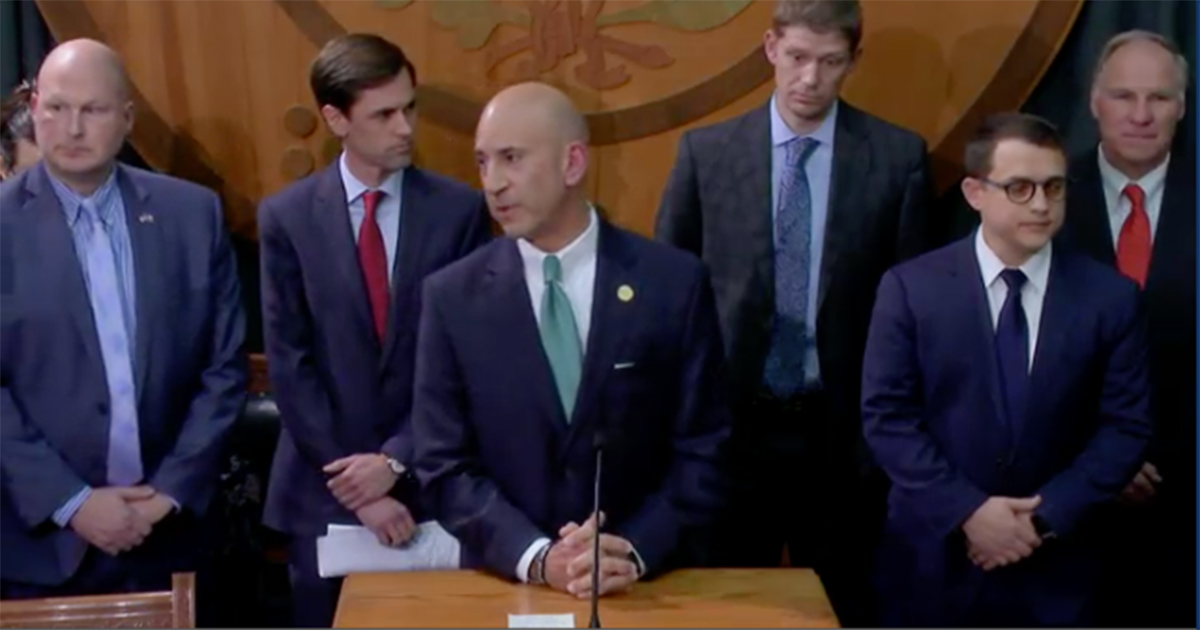
Interview: Wendy Davis on the Abortion Fight and the Future of Women’s Health in Texas

Above: Sen. Wendy Davis during her now famous 11-hour filibuster.
On June 25, Wendy Davis became a national celebrity literally overnight. Her 11-hour filibuster in the Texas Senate to halt a bill that could severely curtail access to abortion captivated people across the country and energized pro-choice Texans to descend on the Capitol. On Friday, the anti-abortion bill will be back in the Senate, where it’s expected to pass. As she prepared for Friday’s debate, Davis took time to sit down with the Observer to talk about the bill’s potential impacts and the state of women’s health in Texas. Here are excerpts from that conversation.
The Observer’s Dave Mann interviews Sen. Wendy Davis.
Texas Observer: Thank you for meeting with us. I wanted to start off with a bit of an oddball question. Since this has all happened, I’m curious if there’s been a strange experience or an odd experience, either stemming from the filibuster or now that you’ve become a national celebrity, has there been an experience that was strange or weird or encouraging or discouraging?
Wendy Davis: Not really a moment, but many moments since then. Back in the district and out on the road, young women, particularly young women, millennial generation women are coming and speaking to me about how empowered they feel right now. I think if we had made every effort to try and make that happen, we never could have come up with the recipe.
What’s been so beautiful about this is it was organic and real, and therefore incredibly meaningful for these young women. They are owning the way they feel right now, and I expect that it’s the beginning for a new momentum. I really believe that.
TO: Do you get the impression that this was organic that sprung up mostly around this bill or do you think this was something that was building up over the course of the cuts to family-planning funds [in 2011], the sonogram bill, the dispute over the Women’s Health Program, the disputes we’ve had here in Texas? Do you get a sense whether this was energy that sprung up around this one event or was this the spark that lit what had been building up over time?
WD: I think a little bit of both. When you think about the women who, in a real world experience, understand what happened with the 2011 budget cuts, the 130,000 women or more who were cut away from their only health service that they had. Those women definitely know what’s happening because they feel it. … But there are women who haven’t had need for that and haven’t understood that legislators a couple of years ago made these draconian cuts.
So for some women, this sparked an unleashing of pent up anger and despair in what was happening to them. For other women, it simply woke them up to what they didn’t understand was happening at all.
So it was a little bit of both.
TO: You mentioned that this was an awakening, in some ways. I’ve heard two takes on what’s happening. One is that this is the beginning of something that could have a profound effect on Texas and Texas politics. And I’ve also heard people say, well, this is a lot of energy that’s happening now, but it’s bound to fade away. I’m curious if you have a sense or an impression or an opinion on which way that might go.
WD: No one can predict. But I would be surprised to see it go away. I’ll compare it for a moment to what we saw in response to the education funding cuts that occurred last session. The public outcry against that in no way compared to what we’re seeing about this bill right now. And yet it sustained itself through the election cycle. I know it played an important role in my reelection, my difficult reelection race in 2012. To the extent, that occurred [with the education cuts], it will be magnified many fold over this particular issue. Because this one hits multi-generational people, women, men who love and care about women, men who have daughters, who know their daughters will be impacted by this. …
There is a unique energy behind it. I’ve never experienced anything like it in my public service life of 15 years. So I think it will sustain. I honestly think it will grow, because there is an active energy trying to make sure that happens.
TO: I want to ask about the [family planning] cuts from last session. There was some action taken on them this session, and there was some money restored through primary care funding. We’ve already seen a lot of clinics close … 60 some odd clinics have closed already. When you think back on the regular session, do you feel the Legislature has sufficiently addressed the cuts to family-planning services that were made in 2011?
WD: There’s extensive lingering damage. First of all, the $100 million that was put back for services that are directed at women was put back into the primary health care arena, not specific to family-planning services, where it once was. About 60 percent of that will go to family planning, but the remainder will not. And that’s not to say women don’t need a broader, more holistic care approach, they certainly do, but financially it leaves a gap. Much more alarming than that is the safety that was once there was shredded with those cuts.
It’s easy for clinics to close overnight. It’s very hard for them to reopen quickly.
With the exclusion of Planned Parenthood from all sources of these women’s health funds now in Texas, we know that 45 percent of the services that were being provided to women in this arena can no longer qualify for those funds. And so regardless of the fact that another $60 million was thrown at it, when you cut out 45 percent of the people who were doing that work from being able to receive those funds—and you think about all the family planning clinics that closed that were not Planned Parenthood clinics—you cannot rebuild that overnight.
We’re already seeing some statistics in terms of what’s been happening as a consequence of that. There were projections about the Medicaid birth rate increasing. I’m disappointed to say it’s been difficult to get that information out of our own state agency—as a state senator. And there’s a reason it’s been hard to get it, because it’s telling a story they don’t want told. …
But there are also fiscally imprudent decisions that are being made. If all we cared about was a conservative approach, which I think we can all agree with. Let’s prevent rather than pay for later. Let’s save a lot of money… . That’s not what’s happening right now. … We are now spending $1.3 billion per year on those unplanned births across Texas… . Let me back up. I’m not sure you could say all of that was unplanned. But that is the Medicaid birth cost, much of which is an unplanned situation.
Taxpayers are losing. Women who needed these services are losing. And the only people who are winning are the politicians who want to put this in their next campaign ad.
TO: The abortion bills didn’t really make much progress during the regular session. Given the fervor we’re seeing now, why do you think those bills didn’t go anywhere during the regular session?
WD: Well, because they couldn’t with the two-thirds block in the Senate. And, honestly, because there are Republican members who didn’t want to see them go anywhere, either.
I know that tomorrow on the Senate floor there will be Republican members who are going to take “yes” votes to pass this legislation, and they would have preferred never to have been put in that situation. I wish that more would do what we’ve seen Rep. Sarah Davis do and just stand for what they believe in.
We all have to live with the decisions that we make. Each of us will feel the consequence of that.
TO: In the last few months, we’ve heard a lot of conversations about family planning and women’s health together with abortion, under the umbrella of women’s health. And it’s a similar conversation to what was going on in 2011, except we saw Republicans conflating family planning and abortion, and using that as their justification for family-planning cuts. So I’m curious if you think that it’s important or advantageous to talk about the universe of women’s health because the issues [of family planning and abortion] are related? Or is it risky to have that conversation because it could be used in a way like it was in 2011—is it better to separate family planning and talk about abortion separately?
WD: I think you can’t talk about them separately. I believe the orange shirts in the Capitol right now and the blue shirts that are here all agree on a mutual goal. And the mutual goal is to decrease abortion. No one is pro abortion. I think that the approach being taken through this bill is completely wrong-headed because changing the legal framework for abortion, changing the access landscape to abortion is not going to decrease the demand for it.
The only thing that really gets to the root of decreasing that demand is decreasing unplanned pregnancies. And the only way to do that is to empower women to be able to achieve that. Women want to be responsible, and I think it is disrespectful to assume that women empowered to prevent unplanned pregnancies won’t choose that.
The other part of that is getting back to a place we once were a long time ago with age-appropriate, scientifically based sex-education courses. And the idea that somehow if we talk to young people about sex and the consequences of unprotected sex will create a demand for it is really absurd and unfortunately is contributing to the high rate of teen pregnancy we see in Texas.
TO: Do you sense any shift among your Republican colleagues on family planning and funding family planning, and getting back to what you were talking about before in preventing unplanned pregnancies as a way to reduce the number of abortions?
WD: I’ve definitely sensed a shift in terms of the way they’re talking about it. I think they understand there’s some pretty valid criticism being wielded in regard to what the consequences of this bill will be. And they’d like to talk the talk of “yes, let’s do everything we can, let’s work in the interim on that.” And that’s great, and I hope it’s sincere. But it won’t happen if we continue to say that Planned Parenthood can’t be a provider of those family-planning services, and it won’t happen if we don’t rebuild the infrastructure that was lost to those cuts.
TO: Is there a part of the bill that you think is most damaging, most impactful. And I don’t want to ask a legal question—but you have legal training—is there a part of the bill that you think is most legally susceptible?
WD: This is a constitutional liberty. And states cannot infringe upon that in a way that creates an undue burden. …
I think probably most problematic for the proponents of this bill is the ambulatory surgical center standard. When that standard was put in place for post 16-week gestational periods, it took about two-and-a-half years before ambulatory surgical centers were on the ground and able to do that work. And that was just to put five of them on the ground. We’re talking about the possibility of 30-plus clinics closing around the state. And even in the best-case scenario, if all the funding in the world could be found, which it won’t be, and they could rebuild, we know that it’s at least two-and-a-half years.
And in the meantime…I don’t want to even think about the meantime.

